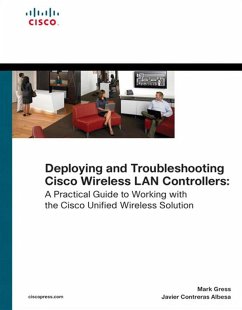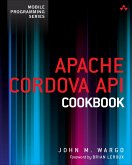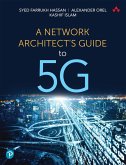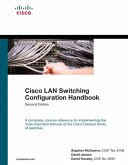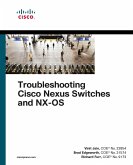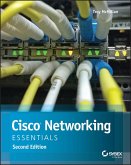This is the only complete, all-in-one guide to deploying, running, and troubleshooting wireless networks with Cisco® Wireless LAN Controllers (WLCs) and Lightweight Access Point Protocol (LWAPP)/Control and Provisioning of Wireless Access Points (CAPWAP). Authored by two of the most experienced Cisco wireless support professionals, the book
presents start-to-finish coverage of implementing WLCs in existing wired and wireless network environments, troubleshooting design-related issues, and using LWAPP/CAPWAP solutions to achieve your specific business and technical goals.
One step at a time, you'll walk through designing, configuring, maintaining, and scaling wireless networks using Cisco Unified Wireless technologies. The authors show how to use LWAPP/CAPWAP to control multiple Wi-Fi wireless access points at once, streamlining network administration and monitoring and maximizing scalability.
Drawing on their extensive problem-resolution experience, the authors also provide expert guidelines for troubleshooting, including an end-to-end problem-solving model available in no other book.
Although not specifically designed to help you pass the CCIE® Wireless written and lab exams, this book does provide you with real-world configuration and troubleshooting examples. Understanding the basic configuration practices, how the products are designed to function, the feature sets, and what to look for while troubleshooting these features will be invaluable to anyone wanting to pass the CCIE Wireless exams.
Part of the CCIE Professional Development Series, this is the first book to offer authoritative training for the new CCIE Wireless Exam.
It will also serve as excellent preparation for Cisco's new
CCNP® Wireless exam.
presents start-to-finish coverage of implementing WLCs in existing wired and wireless network environments, troubleshooting design-related issues, and using LWAPP/CAPWAP solutions to achieve your specific business and technical goals.
One step at a time, you'll walk through designing, configuring, maintaining, and scaling wireless networks using Cisco Unified Wireless technologies. The authors show how to use LWAPP/CAPWAP to control multiple Wi-Fi wireless access points at once, streamlining network administration and monitoring and maximizing scalability.
Drawing on their extensive problem-resolution experience, the authors also provide expert guidelines for troubleshooting, including an end-to-end problem-solving model available in no other book.
Although not specifically designed to help you pass the CCIE® Wireless written and lab exams, this book does provide you with real-world configuration and troubleshooting examples. Understanding the basic configuration practices, how the products are designed to function, the feature sets, and what to look for while troubleshooting these features will be invaluable to anyone wanting to pass the CCIE Wireless exams.
- Efficiently install, configure, and troubleshoot Cisco Wireless LAN Controllers
- Move autonomous wireless network solutions to LWAPP/CAPWAP
- Integrate LWAPP/CAPWAP solutions into existing wired networks
- Understand the next-generation WLC architecture
- Use Hybrid REAP and Home AP solutions to centrally configure and control branch/remote access points without deploying controllers in every location
- Use Mobility Groups to provide system-wide mobility easily and cost-effectively
- Use Cisco WLC troubleshooting tools, and resolve client-related problems
- Maximize quality in wireless voice applications
- Build efficient wireless mesh networks
- Use RRM to manage RF in real-time, optimizing efficiency and performance
- Reference the comprehensive WLC and AP debugging guide
Part of the CCIE Professional Development Series, this is the first book to offer authoritative training for the new CCIE Wireless Exam.
It will also serve as excellent preparation for Cisco's new
CCNP® Wireless exam.
Dieser Download kann aus rechtlichen Gründen nur mit Rechnungsadresse in A, B, BG, CY, CZ, D, DK, EW, E, FIN, F, GR, HR, H, IRL, I, LT, L, LR, M, NL, PL, P, R, S, SLO, SK ausgeliefert werden.
